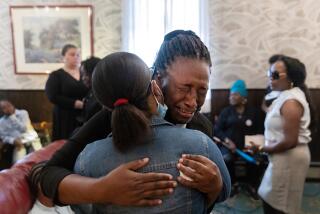Dallas hospital treating Ebola patient acknowledges ‘painful’ days
- Share via
Reporting from Dallas — From the moment he arrived Monday at Texas Health Presbyterian Hospital, Dr. John Bertrand faced the anxiety of his patients fearful because a man with the deadly Ebola virus was being treated there.
The hospital, after all, was where the expectant mothers planned on delivering their babies. One after the other, 25 in all, they asked the 64-year-old OB/GYN if they should go elsewhere.
“One father whose wife was due to have twins in 35 weeks called to ask whether they should look for another hospital to deliver their children,” said Bertrand.
He gave each patient the same advice: Don’t panic.
The North Dallas hospital, considered one of the best in Texas, has come under criticism since the arrival Sept. 25 of Thomas Eric Duncan – the first patient in the U.S. diagnosed with Ebola.
The diagnostic team that treated Duncan — who had symptoms of headache, abdominal pain and fever consistent with the Ebola virus — did not know he told a receiving nurse that he had traveled from Africa. On that day, Duncan was sent home with antibiotics. He returned to the hospital by ambulance two days later.
He remained at Texas Presbyterian on Friday in serious condition.
Hospital officials now blame a technical flaw for the failure to relay the information about Duncan’s background to the doctors. In a statement, the hospital said an electronic records glitch between the nurse who questioned Duncan and the doctor who treated him led to the lapse. The nurse noted in Duncan’s electronic chart that he said he had arrived from Africa. But the information was not transferred to the doctor’s electronic medical notes. Officials say they are now using a new process to record and share patient information.
The hospital statement did not say why the doctor failed to question Duncan about the countries he had visited before coming to the U.S. A hospital spokesman did not respond Friday to an interview request.
On Friday, Barclay Berdan, chief executive officer of the hospital’s parent company, sent an internal memo about the negative publicity. “I understand how painful the last several days of media attention have been for everyone associated with Texas Health Resources, and particularly Texas Health Dallas,” it said in part.
The hospital also released a statement saying the facility continues “to provide compassionate, quality care to the patient who tested positive for Ebola Virus Disease.”
Critics have asked why the doctor did not ask about Duncan’s country of origin the first time he visited the ER. “The doctor should have asked him these questions,” said Stanley Gaye, president of the Liberian Community Assn. of Dallas-Fort Worth. “Had they kept him at the hospital on that Friday, he would not have had the opportunity to expose other people.”
Caught in the middle are doctors like Bertrand, who has a longtime personal and professional connection to Texas Presbyterian.
“I’ve practiced here for 37 years,” he said. “All of my 13 children were born here. Both my mother and father died here.”
Bertrand was on call Saturday at the hospital, delivering three babies, he said.
The following day, his daughter, who is a nurse at the hospital, sent him an email that the facility had placed a probable Ebola patient in isolation.
After two American missionaries contracted Ebola in West Africa and were treated in the U.S., Bertrand said he researched the disease, its symptoms and how it is spread.
But he hadn’t imagined the angst that would greet him at his hospital office this week.
Bertrand said he was taking time to explain the disease to each patient. “This thing is on everybody’s mind,” he said. “I just do not want people with high blood pressure or diabetes sitting at home because they are too afraid to come to this hospital.”
He said he understands the fear. “People have read about this terrible disease with a 50% mortality rate in West Africa and it seems like so far away, but suddenly it’s right here in the middle of Dallas, Texas, right in their own backyards. Some just can’t get past the point of logic. Emotions take over.”
His message has been one of common sense.
“Every time you take an airplane or turn the key to your car, you play risk versus benefit,” he said. “But I know the phones are going to be ringing today with questions about Ebola.”
He believes that Texas Presbyterian will recover from the stumble.
“What happened in that ER last Friday gave a black eye to this hospital,” he said. “It’s easy to play Monday-morning quarterback, but what that patient said should have rang a bell with some supervisor or cross-check person.”
It was still early Friday. Bertrand had just delivered a baby by C-section and he had patients to see. But he thinks the medical profession learned a crucial lesson.
“Anyone who has been to West Africa and has these types of symptoms walks into an emergency room in any hospital in America, they are going to get immediate treatment,” he said. “I think that lesson has been learned from all of this.”
Follow @jglionna for national news
More to Read
Sign up for Essential California
The most important California stories and recommendations in your inbox every morning.
You may occasionally receive promotional content from the Los Angeles Times.














